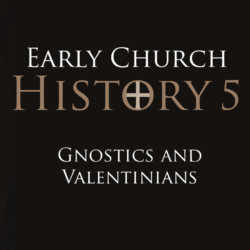Apologetics 6: Historical Jesus
Have you ever heard of the Jesus mythicists? They teach that Jesus never existed, that he’s a myth. How would you go about debunking this claim? Are you aware of what historical sources mention Jesus and early Christianity? In this lecture you’ll learn what’s out there from biblical authors, historians, and hostile witnesses. The cumulative case for the historicity of Jesus of Nazareth is nothing short of staggering.
If you would like to take this class for credit, please contact the Atlanta Bible College so you can register and do the necessary work for a grade.
Notes:
New Testament is not one witness. It was not originally published as a single volume.
Pre-Pauline Quotations
- 1 Corinthians 15.3-4
- Philippians 2.6-10
Paul (wrote between a.d. 51 and 62)
- earliest written documents that mention Jesus
- written 20 – 30 years after death of Jesus
- born of a woman (Gal 4.4; Rom 1.3)
- had disciples (1 Cor 15.5)
- had brothers (1 Cor 9.5; Gal 1.19)
- Lord’s Supper (1 Cor 11.23-25)
- crucified (1 Cor 2.2; 11.23; Gal 3.1)
- put to death by Jews (1 Thes 2.15)
- buried (1 Cor 15.4; Rom 6.4)
- raised from the dead (1 Cor 15.21)
- ascended into heaven (Eph 1.20-23)
James (a.d. <62)
- slave of Jesus (1.1)
- Jesus is Lord Messiah (1.1)
- he is coming back (5.7)
- coming is near (5.8)
Peter (a.d. <62)
- Christ suffered, sinless, bore our sins, did not revile (1 Peter 2.21-24)
- eyewitness of his majesty (transfiguration) (2 Peter 1.16-17)
- he is coming back (2 Peter 3.2-4)
Jude (?)
- slave of Jesus
- several mentions of him, but not historical, mostly future
Mark (a.d < 62)
- got his gospel from Peter
- miracles
- some sayings
- passion narrative
- resurrection stated
- Simon of Cyrene (Mark 15.21)…as if his audience knew Alexander and Rufus
Matthew (after Mark)
- eye-witness
- birth narrative
- extensive teachings
- miracles
- passion narrative
- resurrection appearances
Luke (after Mark)
- investigator, second hand
- birth narrative
- extensive teachings
- miracles
- lots of dinners
- passion narrative
- resurrection appearances
- ascension
- continuity with the church (Acts)
Hebrews (after 62 before 70)
- mostly theological concerned with making the point that Jesus is superior to angels, Moses, Aaron, etc. because he is priest after Melchizedek, better covenant, better promises, etc.
- Christ died (9.26; 10.12; 12.2)
- tempted yet sinless (4.15)
- made like his brethren in all things (2.17)
John (<a.d. 100)
- eye-witness
- pre-ministry miracle (wedding at Cana)
- miracles as signs
- attending festivals
- self-revelatory (“I am… statements)
- resurrection appreances
Flavius Josephus (a.d. 93)
- first non-Christian to write about Jesus
- Passage 1 (about James)
- “but this younger Ananus, who, as we have told you already, took the high priesthood, was a bold man in his temper, and very insolent; he was also of the sect of the Sadducees, {a} who are very rigid in judging offenders, above all the rest of the Jews, as we have already observed; when, therefore, Ananus was of this disposition, he thought he had now a proper opportunity [to exercise his authority]. Festus was now dead, and Albinus was but upon the road; so he assembled the Sanhedrin of judges, and brought before them the brother of Jesus, who was called Christ, whose name was James, and some others, [or some of his companions]; and, when he had formed an accusation against them as breakers of the law, he delivered them to be stoned: but as for those who seemed the most equitable of the citizens, and such as were the most uneasy at the breach of the laws, they disliked what was done; they also sent to the king [Agrippa], desiring him to send to Ananus that he should act so no more, for what he had already done was not to be justified” (Ant 20:199-201 JOE)
- Passage 2 (about Pilate and Jesus)
- But now Pilate, the procurator of Judea, moved the army from Caesarea to Jerusalem, to take their winter quarters there, in order to abolish the Jewish laws. So he introduced Caesar’s effigies, which were upon the ensigns, and brought them into the city; whereas our law forbids us the very making of images; on which account the former procurators were wont to make their entry into the city with such ensigns as had not those ornaments. Pilate was the first who brought those images to Jerusalem, and set them up there; which was done without the knowledge of the people, because it was done in the night time; but as soon as they knew it, they came in multitudes to Caesarea, and interceded with Pilate for many days that he would remove the images; and when he would not grant their requests, because it would tend to the injury of Caesar, while yet they persevered in their request, on the sixth day he ordered his soldiers to have their weapons secretly, while he came and sat upon his judgment seat, which seat was so prepared in the open place of the city, that it concealed the army that lay ready to oppress them; and when the Jews petitioned him again, he gave a signal to the soldiers to surround them, and threatened that their punishment should be no less than immediate death, unless they would stop disturbing him, and go their ways home. But they threw themselves upon the ground, and laid their necks bare, and said they would take their death very willingly, rather than the wisdom of their laws should be transgressed; upon which Pilate was deeply affected with their firm resolution to keep their laws inviolable, and presently commanded the images to be carried back from Jerusalem to Caesarea.But Pilate undertook to bring an aqueduct Jerusalem, and did it with the sacred money, and took the water of the stream from the distance of twenty-five miles. However, the Jews {a} were not pleased with what had been done about this water; and many ten thousands of the people got together, and made a clamour against him, and insisted that he should stop that design. Some of them, also, used reproaches, and abused the man, as crowds of such people usually do. So he outfitted a great number of his soldiers in their clothes, who carried daggers under their garments, and sent them to a place where they might surround them. So he bade the Jews himself go away; but they boldly casting reproaches upon him, he gave the soldiers that signal which had been beforehand agreed on; who laid upon them much greater blows than Pilate had commanded them, and equally punished those who were tumultuous, and those who were not, nor did they spare them in the least; and since the people were unarmed, and were caught by men prepared for what they were about to do, there were a great number of them slain by this means, and others of them ran away wounded; and thus an end was put to this sedition.Now there was about this time Jesus, a wise man, if it be lawful to call him a man; for he was a doer of wonderful works–a teacher of such men as receive the truth with pleasure. He drew over to him both many of the Jews and many of the Gentiles. He was [the] Christ. And when Pilate, at the suggestion of the principal men among us, had condemned him to the cross, {b} those that loved him at the first did not forsake him, for he appeared to them alive again the third day, {c} because the divine prophets had foretold these and ten thousand other wonderful things concerning him; and the sect of Christians, so named from him, are not extinct at this day. About the same time, also, another sad calamity put the Jews into disorder; and certain shameful practices happened about the temple of Isis that was at Rome. I will now first take notice of the (Ant 18:55-65 JOE)
- scholarly reconstruction
- “About this time there lived Jesus, a wise man…For he was one who wrought surprising feats and was a teacher of such people as accept the truth gladly. He won over many Jews and many of the Greeks…When Pilate, upon hearing him accused by men of the highest standing among us, had condemned him to be crucified, those who had in the first place come to love him did not give up their affection for him…And the tribe of Christians, so called after him, has still to this day” (pages 79-80 Case for Christ by Lee Strobel)
Pliny the Younger (a.d. 111)
- his father Pliny the Elder was a famous Roman administrator and natural scientist
- he died in a ship observing the a.d. 79 eruption of Mt. Vesuvius (got too close)
- Pliny the younger carried on correspondence with Trajan (who liked to micro manage everything)
- Pliny was governor of Bithynia-Pontus
- law was passed against gathering together for social groups
- constant fear of uprisings and revolutions
- Pliny wrote asking about the establishment of a fire department
- Trajan wrote back denying such a formation
- Pliny also wrote about the Christians who were gathering together illegally
- “I have asked them if they are Christians, and if they admit it, I repeat the question a second and third time, with a warning of the punishment awaiting them. If they persist, I order them to be led away for execution; for, whatever the nature of their admission, I am convinced that their stubbornness and unshakable obstinacy ought not go unpunished…They also declared the sum total of their guilt or error amounted to no more than this: they had met regularly before dawn on a fixed day to chant verses alternately amongst themselves in honor of Christ as if to a god, and also to bind themselves by oath, not for any criminal purpose, but to abstain from theft, robbery, and adultery…This made me decide it was all the more necessary to extract the truth by tortur from two slave-women, whom they called deaconesses. I found nothing but a degenerate sort of cult carried to extravagant lengths.” (page 83-84 Case for Christ by Lee Strobel)
Suetonius (a.d. 115)
- Lives of the Twelve Caesars
- Roman historian
- mentions explusion of the Jews from Rome because of some disturbance (cf. Acts 18.1-3)
- he speaks of “Chrestus,” which could be a misspelling of “Christus” or just be a person named “Chrestus”
- Claudius 25
- He banished from Rome all the Jews, who were continually making disturbances at the instigation of one Chrestus
- Nero 16
- He likewise inflicted punishments on the Christians, a sort of people who held a new and impious superstition.
Tacitus (a.d. 115)
- born 25 years after Jesus’ death
- Roman senator
- Roman historian who wrote a book called Annals
- book 15 chapter 44
- “Nero fastened the guilt and inflicted the most exquisite tortures on a class hated for their abominations, called Christians by the populace. Christus, from whom the name had its origin suffered the extreme penalty during the reign of Tiberius at the hands of one of our procurators, Pontius Pilate, and a most mischievous superstition, thus checked for the moment, again broke out not only in Judaea, the first source of the evil, but even in Rome…Accordingly, an arrest was first made of all who pleaded guilty: then, upon their information, an immense multitude was convicted, not so much of the crime of firing the city, as of hatred against mankind.” (page 82 Case for Christ by Lee Strobel)
- both Suetonius and Tacitus wrote about the fire of Nero being blamed on the Christians
- gets Pilate wrong, he is prefect not procurator
Gospel of Thomas (2nd c.?)
- little emphasis on historical Jesus
- focus is on his sayings or logia
- also it is rather late
Quadratus (written between a.d. 117 and 124)
- sometimes called the first apologist
- claimed to know some who were healed by Jesus
- Ecclesiastical History 3.2
- “The words of our Savior were always present, for they were true: those who were healed, those who rose from the dead, those who were not only seen in the act of being healed or raised, but were also always present, not merely when the Savior was living on earth, but also for a considerable time after his departure, so that some of them survived even to our own times.”
Papias (a.d. 120-130)
- famously preferred eye-witnesses to written accounts
- lived in Hieropolis
- Expositions of the Sayings of the Lord (Ecclesiastical History 3.39)
- But I shall not hesitate also to put down for you along with my interpretations whatsoever things I have at any time learned carefully from the elders and carefully remembered, guaranteeing their truth. For I did not, like the multitude, take pleasure in those that speak much, but in those that teach the truth; not in those that relate strange commandments, but in those that deliver the commandments given by the Lord to faith, and springing from the truth itself. If, then, any one came, who had been a follower of the elders, I questioned him in regard to the words of the elders,–what Andrew or what Peter said, or what was said by Philip, or by Thomas, or by James, or by John, or by Matthew, or by any other of the disciples of the Lord, and what things Aristion and the presbyter John, the disciples of the Lord, say. For I did not think that what was to be gotten from the books would profit me as much as what came from the living and abiding voice.”
- …And Papias, of whom we are now speaking, confesses that he received the words of the apostles from those that followed them, but says that he was himself a hearer of Aristion and the presbyter John. At least he mentions them frequently by name, and gives their traditions in his writings. These things we hope, have not been uselessly adduced by us.
-
- For he neither heard the Lord nor followed him, but afterward, as I said, he followed Peter, who adapted his teaching to the needs of his hearers, but with no intention of giving a connected account of the Lord’s discourses,1 so that Mark committed no error while he thus wrote some things as he remembered them. For he was careful of one thing, not to omit any of the things which he had heard, and not to state any of them falsely.” These things are related by Papias concerning Mark.
- But concerning Matthew he writes as follows: “So then2 Matthew wrote the oracles in the Hebrew language, and every one interpreted them as he was able.”3 And the same writer uses testimonies from the first Epistle of John4 and from that of Peter likewise.5 And he relates another story of a woman, who was accused of many sins before the Lord, which is contained in the Gospel according to the Hebrews.6 These things we have thought it necessary to observe in addition to what has been already stated.
Mara bar Serapion (a.d. 73 to 200)
- refers to three wise men
- murder of Socrates
- burning of Pythagoras
- execution of the wise king of the Jews
- examples when wrongdoing resulted in punishment by God
- Letter of Mara Son of Serapion
- What are we to say, when the wise are dragged by force by the hands of tyrants, and their wisdom is deprived of its freedom18 by slander, and they are plundered for their superior intelligence, without the opportunity of making a defence? They are not wholly to be pitied. For what benefit did the Athenians obtain by putting Socrates to death, seeing that they received as retribution for it famine and pestilence? Or the people of Samos by the burning of Pythagoras, seeing that in one hour the. whole19 of their country was covered with sand? Or the Jews by the murder of their Wise King, seeing that from that very time their kingdom was driven away from them? For with justice did God grant a recompense to the wisdom of all three of them. For the Athenians died by famine; and the people of Samos were covered by the sea without remedy; and the Jews, brought to desolation and expelled from their kingdom, are driven away into Every land.
- probably not a Christian since he puts Jesus on the same level as the others and does not refer to him as savior or Lord, but primarily as teacher of wisdom
Lucian of Samosata (between a.d. 165-175)
- Passing of Peregrinus
- chapter 11
- “It was then that he learned the wondrous lore of the Christians, by associating with their priests and scribes in Palestine. And—how else could it be?—in a trice he made them all look like children, for he was prophet, cult-leader, head of the synagogue, and everything, all by himself. He interpreted and explained some of their books and even composed many, and they revered him as a god, made use of him as a lawgiver, and set him down as a protector, next after that other, to be sure, whom they still worship, the man who was crucified in Palestine because he introduced this new cult into the world.”
- the earliest written critique of Christianity assumed his existence (so did Celsus)
Talmud (a.d. 500)
- Babylonian Talmud
- hard to tell if references are to Jesus or not
- Yeshu ha-Notzri
- ben Satda
- ben Panthera
- Sanhedrin 43a
- On the eve of the Passover Yeshu was hanged. For forty days before the execution took place, a herald went forth and cried, ‘He is going forth to be stoned because he has practised sorcery and enticed Israel to apostacy. Any one who can say anything in his favour, let him come forward and plead on his behalf.’ But since nothing was brought forward in his favour he was hanged on the eve of the Passover! — Ulla retorted: ‘Do you suppose that he was one for whom a defence could be made? Was he not a Mesith [enticer], concerning whom Scripture says, Neither shalt thou spare, neither shalt thou conceal him? With Yeshu however it was different, for he was connected with the government [or royalty, i.e., influential].’
also, check out Greg Boyd’s essay for Thallus (among others) http://reknew.org/2008/01/corroborating-historical-evidence-of-the-new-testament/
The day the earth went dark (read Matthew 27.45; Mark 15.33; Luke 23.44-45) “This phenomenon, evidently, was visible in Rome, Athens, and other Mediterranean cities. According to Tertullian…it was a ‘cosmic’ or ‘world event.’ Phlegon, a Greek author from Caria writing a chronology soon after 137ad, reported that in the fourth year of the 202nd Olympiad (i.e., 33ad) there was ‘the greatest eclipse of the sun’ and that ‘it became night in the sixth hour of the day [i.e., noon] so that stars even appeared in the heavens. There was a great earthquake in Bithynia, and many things were overturned in Nicaea.’” (page 85 Case for Christ by Lee Strobel)







Thanks for the podcast! Also for the accessible and well structured content on this episode. Question on Papias: should we really ascribe to Papias a great deal of reliability because of his oral history sources? His account of the death of Judas and the parable of the grapes seem unlikely. Furthermore, as you conceded, there is an issue with the so-called Matthew gospel (I suspect a different text entirely given the title “sayings”, in which case not much of a concession there, just an underlining of the problem of authorship of what we call Matthew). Finally, how do we square all these followers of the disciples being located somewhere accessible to Papias if they really did go and die in their alleged missionary destinations?
Cheers,
John, Marseille, France.
It seems the redactor of Papias’s statements conflated a fabricated interpretation of Judas’s death. A quick death falling from a snapped rope was clearly too good for the later reader considering the betrayal of Christ as probably the worst act of anyone, ever; ‘Death was too good for him’. It may also reflect how far the fruit of apostate Christianity had fallen from the tree ‘paying attention to fanciful stories’ (1 Tim 1:4) as the Apostle Paul put it. Interestingly the Testimonium Flavian, dismissed by todays scholars as a later Christian interpolation has recently been reappraised by historian and classical literature specialist, Serge Bardet in his ‘Le Testimonium Flavianum—Examen historique considérations historiographiques’ (The Testimonium Flavianum—A Historical Study With Historical Considerations). Pierre Geoltrain, (eminent specialist of Hellenistic Judaism and primitive Christianity) for one, is convinced by Bardet’s research. Having long considered the Testimonium to be an interpolation, he at one time ridiculed those who believed in its authenticity. He now concludes that Bardet’s work as the reason for this change of mind, declaring that “nobody should henceforth dare to speak of the ‘implausible testimony’ of Josephus.” I found this in an Watchtower article (THE WATCHTOWER (STUDY EDITION) MARCH 2013, if you are interested) Although a Christian’s faith relies on God’s Word not man’s opinions, it is noteworthy I think and could be a useful thought to present to those still reciting the largely discredited mantras of higher criticism .
Dear Sean
I recently listened to this episode and there are a couple of things I would appreciate your input on regarding some statements made in this podcast.
In this podcast you say that the Gospel of Mark was given to Mark by the Apostle Peter. At the beginning of the podcast you mention that you would provide documentation to show this but unfortunately end of the recording got corrupted and you filled in the blanks yourself but I did not hear you mention this reference to Mark obtaining his gospel from Peter.
We know from 2 Tim 3:16 that all scripture is given by inspiration of God (God breathed) and also from 2 Pet 1:21 that the word of God did not come by the will of man but men wrote as they were inspired from God. Paul also tells us that his revelation came from Jesus Christ (Gal 1:11,12)
To say that Mark got his gospel from Peter sounds to me like Mark had predetermined this and so I would like to see this reference. Perhaps its like Jeremiah and his scribe Baruch. Baruch wrote down what Jeremiah told him, but we know that this is what God told Jeremiah to do. Do we get the same confirmation between Peter and Mark.
Regarding the gospel of Luke you talk about Luke interviewing those who were eyewitness of the accounts portrayed which verse 2 indicates however in verse 3 Luke says “having had perfect understanding of all things from the very first” these words “from the very first” are translated from the greek anōthen which in many verses is translated “Above”. Which would render Luke as saying having had perfect understanding from above” which seems a logical statement that fits with the other verse on how we got the word but also I cannot see any bible translations that render it this way which makes me think there must be more going on in the Greek than I am aware of.
Really enjoying this class thanks for all your efforts to get this material out.
Cheers
John